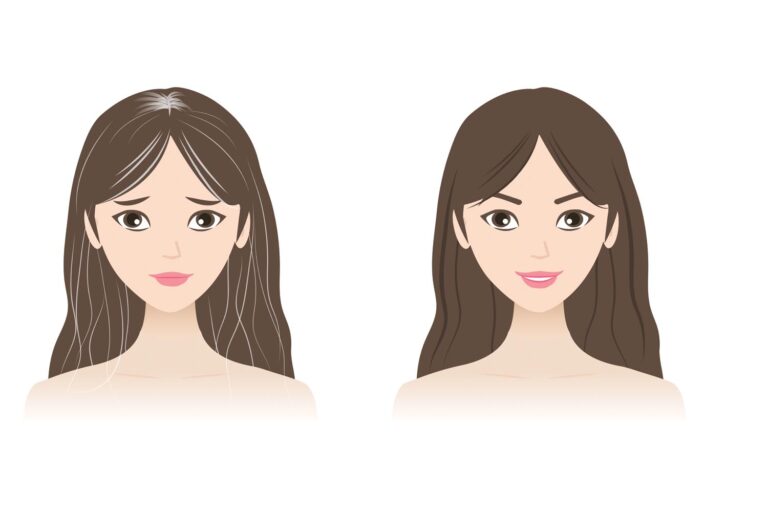Premature graying of hair, or gray hair, is a phenomenon experienced by many people and often leads to concerns about aging and self-image. Although generally recognized as a natural phenomenon of aging, many people notice gray hair long before they age.
Dr Palash Shrestha, Consultant Dermatologist, B&B Skin and Aesthetic Clinic, B&B Hospital, Gwarko, explains premature graying of hair and how genetics and lifestyle factors contribute to it.
Why do some people experience premature graying of hair (PMGH) or gray hair?
Premature gray hair, also known as gray hair, is primarily influenced by genetics inherited from your parents. Premature gray hair is generally defined as the onset of gray hair before the age of 20 or, in some ethnic groups, before the age of 30.
In recent generations, the prevalence of premature graying of hair has increased. Genetics plays a big role, but various lifestyle and environmental factors can worsen the condition.
Stress, emotional strain, environmental pollution, UV exposure, nutritional deficiencies, thyroid disease, and certain medications such as chemotherapy are all potential causes of premature graying of hair.
Is it possible that stress is a direct cause of premature graying of hair?
Research shows that stress can cause premature graying of hair, although the relationship is complicated. Studies on animals have demonstrated that induced stress can cause graying of the fur. However, it remains unclear whether these findings directly apply to humans.
Genetic factors are the main cause of gray hair, but stress can make this condition worse. It’s common to think that gray hair is caused by various stressors such as work pressure or personal challenges, but this isn’t true for everyone. While some people’s hair turns gray due to genetic predisposition or stress, others do not see a significant relationship between stress levels and changes in hair color.
How do genetics and lifestyle factors contribute to premature graying of hair?
Genetic and lifestyle factors play an important role in the development of premature graying of hair. Medically speaking, oxidative stress (a condition caused by various environmental and internal challenges such as radiation, inflammation, and psychological stress) causes aging, and gray hair is a prominent sign of this process.
When these factors are present in our environment at an early age, free radicals are produced in the hair follicles. These free radicals damage melanocytes, the cells responsible for producing melanin, resulting in gray hair and premature hair loss.
Are there any effective treatments or remedies to prevent or reverse premature graying of hair?
Despite extensive research into the molecular causes of premature hair graying, effective treatments remain elusive. Several topical and oral therapies have been considered, but they often have inconsistent results, with symptoms returning or not appreciably improving.
As a result, multiple treatment approaches are currently under investigation. Stress is thought to play an important role in this process, as it can cause telogen effluvium, which accelerates hair loss. When hair enters this cycle, it may regrow, but it often lacks pigment due to oxidative stress that damages the pigment-producing cells within the hair follicle. This causes affected individuals to have a mixture of gray and dark colored hair.
Currently, the simplest treatments for managing premature gray hair include using gray hair dye to cover gray hair or implementing stress-reducing techniques. Some research suggests that reducing stress may help restore hair color, but further research is needed to confirm these findings and understand the underlying mechanisms.
Is premature graying of hair a sign of an underlying health problem, such as a vitamin deficiency or autoimmune disease?
In most cases, no. However, in some cases, premature gray hair can indicate an underlying health problem. In some cases, deficiencies in essential vitamins and minerals such as vitamin B12, vitamin D, iron, zinc, and calcium can contribute to hair depigmentation. These nutrients are very important for the activity of tyrosinase, an enzyme necessary for hair pigmentation and growth.
Additionally, autoimmune diseases, especially those that affect the thyroid, can also cause premature graying of hair. Certain drugs used to treat autoimmune diseases may have similar effects.
Medical professionals often perform pathological investigations to determine if an underlying health problem is causing premature graying of hair. If a deficiency or disorder is identified, treating the condition can result in repigmentation of the hair.
Does diet play a role in maintaining natural hair color? If so, what foods and nutrition can help delay gray hair?
Food is a source of nutrition for all living things. Therefore, changes in diet or its deficiency can lead to nutritional deficiencies. In some studies, irregular mealtimes, fruit intake, and poor diet were significantly associated with premature graying of hair.
Fruits have antioxidant properties and are rich in vitamins. It helps combat oxidative stress, which causes aging and gray hair. Its intake certainly helps in reducing aging and gray hair.
Significant reductions in zinc levels, ferritin, calcium, and vitamin B12 all contribute to premature graying of hair. A balanced diet that includes dairy products, dark leafy vegetables, fish, oysters, lean meats, peanuts, almonds, liver, mushrooms, and citrus fruits provides essential vitamins, minerals, and folic acid to support healthy hair. I will.

